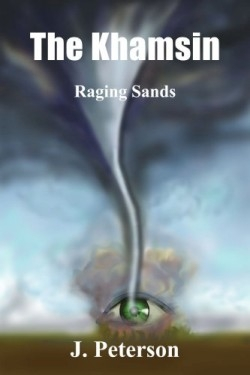The Khamsin
Raging Sands
[i]The Persians set forth from [an] oasis across the sand. As they were at their midday meal a wind arose from the south strong and deadly bringing with it vast columns of whirling sand which entirely covered up the troops and caused them wholly to disappear[/i]. —Herodotus
In 1944 Joanne leaves her Greenpoint Brooklyn cold water flat to join the Women’s Army Corps. She has been assigned office duty in Cairo Egypt. Methodically terrorized by gangsters from nearby neighborhoods; once on the ship Joanne doesn’t much miss home. Once in Cairo however the office assignments become sour discordant situations with several peers developing grudges. As it isn’t possible to disconnect from the entire human race Joanne can best remedy her troubles by reshaping her own unpleasant personality. Readers eager to see that happen had better pack a lunch. Brooklyn flashbacks constitute a large portion of the action. Joanne is in the habit of mentally reviewing her disappointments and damaging episodes: her father is a distant figure her mother has resigned from family life and left the city after years of vacillation.
All references to combat zones are sidebars regarding the fates of relatives fighting in Europe and the Philippines. The author is fond of stock phrases common in the 1940s. One short passage includes: “Black is black and white is white…A person’s home is their castle…Birds of a feather stick together.”
Joanne makes an unsatisfying protagonist as she is too unlikeable to root for and not calculating enough to follow as an anti-hero. She lacks sufficient understanding of friendship workplace expectations etiquette men cause and effect. The author may be making a point by anchoring her story on such an unhappy character but with scant evolution as the story progresses she seems equally unimpressed with her creation.
Characters from Egyptian Arab and Native American cultures are much more engaging. A wealthy businessman from the Khan el-Khalili Bazaar known as Mohammed the Traveler provides timely assistance twice when Joanne stumbles into the wrong places. Her Chippewa roommate from Minnesota is collected and centered. She always carries a copy of Longfellow’s Hiawatha. The two form a limited bond. “…they both knew how to keep a secret. Joanne because of her low regard for fellow humans and Pokie because of her native reticence to burden others. Pride and dignity. That was what mattered in the end.”
The widely traveled author J. Peterson was educated in New York City where she is employed in law offices. Scenes set away from the hotel barracks and army offices are thumbnail sketches of a country attractive to Westerners for its sheer differences. Of course the freak sandstorm this book is named for makes an appearance and the ending opens a door to a possible sequel. Those who work or have worked in a military setting are the most likely to find The Khamsin appealing.
Disclosure: This article is not an endorsement, but a review. The publisher of this book provided free copies of the book and paid a small fee to have their book reviewed by a professional reviewer. Foreword Reviews and Clarion Reviews make no guarantee that the publisher will receive a positive review. Foreword Magazine, Inc. is disclosing this in accordance with the Federal Trade Commission’s 16 CFR, Part 255.

